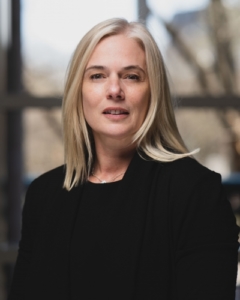
You can’t teach an old dog new tricks.
Executive MBAs might beg to disagree.
In fact, learning new tricks is why they returned to business school. Why else would they shoulder the extra hours, work, and travel? Sure, EMBAs are already successful; many head divisions – or companies for that matter. Looking ahead, many have anticipated the hardest lesson in business…
What got you here won’t get you there.
A CONFIDENCE BUILDER

The Wharton School’s Denise Carter
That was the case for ESADE’s Cristian Lago Rodríguez. A psychologist and researcher by training, Rodríguez embarked on a career change. He co-founded Singular Synergy, a tourism consulting firm that helps clients develop more inclusive experiences for special needs and aging populations. As he gradually discovered, it takes more than good intentions to tailor solutions that foster access and belonging. It requires financial and operational know-how to sustain a venture. More than that, success hinges on strategy for positioning the service and leadership for sustaining the mission. During his MBA program, Rodríguez gained invaluable insights on making his daily activities more impactful while capitalizing on larger industry trends.
“The MBA is a gift that keeps on giving,” explains Rodríguez. “A student’s vision at the beginning of the programme is a technical one, and he or she gets insights on the sector and how one can progress. As time goes by, one’s vision deepens, revealing why things happen and how to avoid failure.”
Such growth delivers more than expertise. The MBA experience also instills a confidence that spills over far beyond the classroom, says Denise Carter, a chemist who became the COO of a pharmaceutical firm.
“One of my biggest lessons has been that a strong belief in your own capabilities is half the battle of accomplishing anything,” writes the 2019 Wharton School grad. “Almost immediately after starting the program, I recognized my confidence level when I walked into investor meetings was much higher. This program has made me realize that I am more capable than I previously thought.”
DON’T NEED TO BE PERFECT
That includes balancing the demands of work, school, and family. For many, the executive MBA program was an ongoing master class in setting priorities, understanding limits, and choosing production over perfection.
“Work-life balance takes on new meaning,” adds Jacob Gelbaum, a husband, father, and technology consultant who earned his MBA at Georgia Tech. “Your family commits to the EMBA too. You must be more focused with your time to complete your studies. Recognize quickly that the “A” doesn’t matter when the “B” allows you to see your child’s recitals. After the EMBA, your new-found available time becomes a resource you should dole out with just as much care.”
Those were just a few takeaways amassed by Poets&Quants‘ Best & Brightest Executive MBAs from the Class of 2019. This year, P&Q asked our 100 Best & Brightest to look back on their EMBA experience and share their biggest lessons from business school – and how they immediately applied them at their jobs. Here are a dozen of their most-common refrains.
1) Know Your Weaknesses: “If you don’t know something, surround yourself with people smarter than you. Learn from them and give them the support they need to be the best they can be. It starts with being self-aware of your gaps. As Steve Jobs noted, “It doesn’t make sense to hire smart people and tell them what to do; we hire smart people so they can tell us what to do.”
Stephanie Tanous, University of Chicago (Booth)

Columbia Business School’s T. Robert Zochowski
2) You Are Responsible For Culture: “Leadership is more about creating an environment in which others can thrive and less about a formal title. This is incredibly empowering as it means anyone at any level can be a leader. I immediately considered how I was cultivating such an environment within my organization and realized that many days I was too focused on my to-do list and emails. I started bringing donuts to my team on Thursdays or Fridays and sitting down at the desks of team members to ask them how they were doing, their weekend plans, and what obstacles they were facing in their work where I could help. Several colleagues told me that they really felt heard, valued, and supported as a result of these interactions and I believe that it has helped to boost morale.”
Robert Zochowski, Columbia Business School
“Culture eats strategy for breakfast.” As a manager, this is a very humbling realization. You can plan your strategy and think long and hard about how to manage change in your organization, but failure to recognize just how powerful culture is can railroad your best laid plan. In my current position, managing the culture – investing in developing a unifying history, identifying artifacts, cultivating shared values, mission, and vision – is time well invested. We now celebrate our victories and we learn together from our mistakes.”
Isabel Dansereau, McGill-HEC Montreal
3) Listen More Than Talk: “I have been working more on asking questions and tuning into the responses. I try not to decide for our team too quickly but let them generate ideas on how to solve our biggest dilemmas. We are all learning, growing, and coming up with better results.”
Amanda Davis, Arizona State (W. P. Carey)
4) Attitude Is Everything: “For me, the biggest lesson had to be the power of positive thinking and developing good habits. A positive growth mindset, a ‘can do’ attitude, and developing and practicing good habits have had a tremendous effect on my performance outcomes at work. Consolidating the above is enabling me to invoke positive energy without conscious intent, allowing me to manage my time and mental resource more efficiently. For example, I have developed a habit for continuous learning to upskill myself by committing to learn something new every week that I think unlocks crucial information I need to view challenges and decisions from different lenses. This is revealing insights into important functions and challenges as well as areas where I can add value or acquire new knowledge. This has allowed me to work smarter and work through others to deliver change and increase the team’s productivity without expending all my valuable will power.”
Alither Rutendo Paidamoyo Mutsago, London Business School
“Throughout this MBA journey, the biggest takeaway for me has been the confidence to lead a meeting, presentation, or discussion, even when I am not the subject matter expert in the room. The number of presentations that we all had to give in front of our peers and professors—who were often more qualified than us to speak on the subject—gave us the confidence to lead even in the midst of uncertainty and self-doubt. This confidence and the leadership skills we have gained are clearly translatable to our work.”
Jasper Daniel, Yale School of Management
“Business school is being presented over-and-over with things that you don’t think you can do – and then doing them. I love that I now have that muscle memory when faced with a significant challenge. I know that I can do anything, that no problem is insurmountable and I have skills and a network that will serve me no matter what faces me.”
Allison K. Hill, UCLA (Anderson)
“These are risks that extend beyond creating the next best new venture, but encompass trusting and relying on others, trusting my own intuition, and embracing change. This risk-taking has allowed me to see how much I have to offer and has given me a level of confidence that I have never experienced before. A confidence that says that what I have to say and the impact I want to make has value. This confidence allows me to make my voice heard in the boardroom and harness the ideas of others. Natasha VanWright, Cornell University (Johnson)





Questions about this article? Email us or leave a comment below.